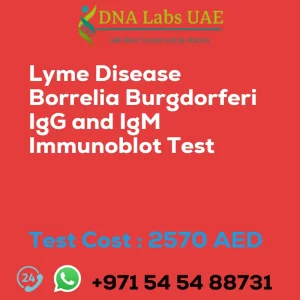Ebola Virus Viral Load Quantitative Test
Cost: 2380.0 AED
Test Name
Ebola Virus Viral Load Quantitative Test
Components
Whole Blood, serum, plasma, C.S.F. nasal swabs, throat swabs. Body secretions, organs or other bodily fluids
Report Delivery
4th Working Day Email: 48 hours. On phone: 36 hours
Method
Real Time PCR
Test Type
Viral
Doctor
Physician
Test Department
Genetics
Pre Test Information
Need to sign Consent document and bring any clinical history of patient for Ebola Virus Viral Load Quantitative Test
Test Details
The Ebola virus viral load quantitative test is a diagnostic test used to measure the amount of Ebola virus present in a patient’s blood. This test is important in determining the severity of the infection and monitoring the progression of the disease.
The test involves collecting a blood sample from the patient and isolating the virus’s genetic material, known as RNA. The RNA is then amplified using a technique called reverse transcription-polymerase chain reaction (RT-PCR). This amplification process allows for the detection and quantification of the viral RNA.
The results of the test are reported as the number of viral copies per milliliter of blood. A higher viral load indicates a more severe infection and a greater risk of transmission. Monitoring changes in viral load over time can help healthcare professionals assess the effectiveness of treatment and determine the appropriate course of action.
The Ebola virus viral load quantitative test is typically performed in specialized laboratories equipped with the necessary equipment and expertise. It is an essential tool in diagnosing and managing Ebola virus infections.
| Test Name | Ebola Virus Viral Load Quantitative Test |
|---|---|
| Components | |
| Price | 2380.0 AED |
| Sample Condition | Whole Blood, serum, plasma, C.S.F. nasal swabs, throat swabs. Body secretions, organs or other bodily fluids |
| Report Delivery | 4th Working Day Email : 48 hours.On phone : 36 hours |
| Method | Real Time PCR |
| Test type | Viral |
| Doctor | Physician |
| Test Department: | Genetics |
| Pre Test Information | Need to sign Consent document and bring any clinical history of patient forEbola Virus Viral Load QuantitativeTest |
| Test Details |
The Ebola virus viral load quantitative test is a diagnostic test used to measure the amount of Ebola virus present in a patient’s blood. This test is important in determining the severity of the infection and monitoring the progression of the disease. The test involves collecting a blood sample from the patient and isolating the virus’s genetic material, known as RNA. The RNA is then amplified using a technique called reverse transcription-polymerase chain reaction (RT-PCR). This amplification process allows for the detection and quantification of the viral RNA. The results of the test are reported as the number of viral copies per milliliter of blood. A higher viral load indicates a more severe infection and a greater risk of transmission. Monitoring changes in viral load over time can help healthcare professionals assess the effectiveness of treatment and determine the appropriate course of action. The Ebola virus viral load quantitative test is typically performed in specialized laboratories equipped with the necessary equipment and expertise. It is an essential tool in diagnosing and managing Ebola virus infections. |








